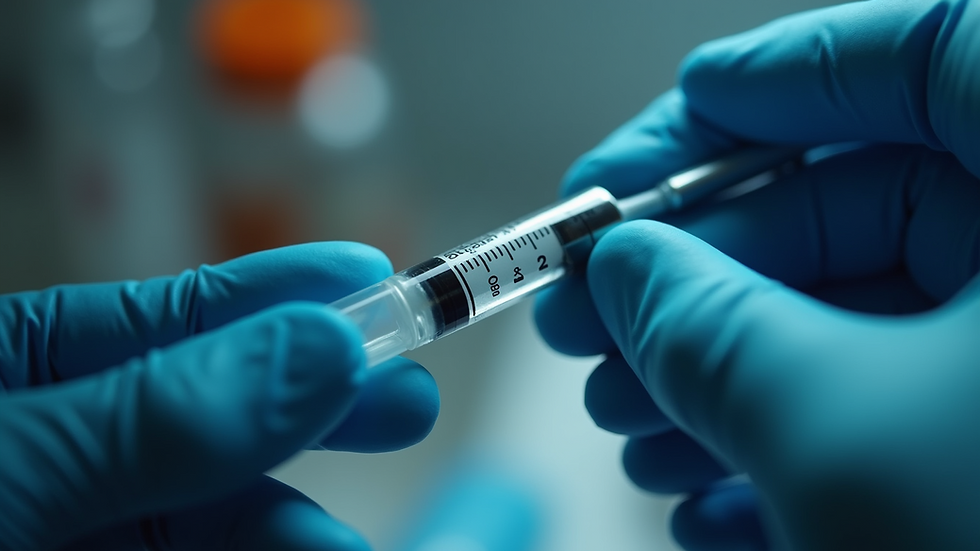Aging as a Disease: Unraveling the Mysteries of Biological Age and Its Impact on Mortality
- LeNae Goolsby

- Jul 30, 2024
- 4 min read

Aging is often seen as a natural part of life, but recent research suggests that it might be more appropriate to view it as a disease—a condition that can be measured, managed, and potentially treated. Understanding the concept of biological age and its measurement is crucial in this paradigm shift. Biological age, as opposed to chronological age, provides a more accurate picture of an individual's health and longevity. This blog post explores the intricate details of biological age, its measurement, and the factors influencing it, both positively and negatively.
Understanding Cellular-Based Aging
Cellular aging refers to the gradual decline in cell function and viability over time. Various mechanisms drive this process, including DNA damage, telomere shortening, and oxidative stress. As cells age, their ability to repair themselves diminishes, leading to an accumulation of cellular damage and, ultimately, the deterioration of tissues and organs.
How We Measure Biological Age
Biological age is measured using a variety of methods that assess different aspects of cellular and molecular aging. Some of the most common methods include:
1. Epigenetic Clocks: These are the most advanced tools for measuring biological age. Epigenetic clocks analyze patterns of DNA methylation, a chemical modification that affects gene expression without altering the DNA sequence. By examining these patterns, scientists can accurately estimate an individual's biological age.
2. Telomere Length: Telomeres are protective caps at the ends of chromosomes that shorten with each cell division. Measuring telomere length can provide insights into cellular aging, although it is not as precise as epigenetic clocks.
3. Biomarker Proxies: Biomarkers such as inflammation markers, lipid profiles, and hormone levels can also serve as proxies for biological age, offering additional information about an individual's health status.
While advanced methods provide accurate measurements, simpler indicators like sprint speed and grip strength can offer loose but useful insights into biological age. These physical performance measures reflect muscle strength, coordination, and overall fitness, which tend to decline with age.
Epigenetic biomarker proxies, such as DNA methylation patterns, are key to understanding biological age. Lifestyle choices can influence these biomarkers, allowing individuals to potentially "pull levers" to improve their biological age. For example, adopting a healthier diet, engaging in regular physical activity, and reducing stress can positively impact these epigenetic markers.
Biological Age and All-Cause Mortality
Biological age is closely tied to all-cause mortality, meaning that individuals with a higher biological age relative to their chronological age are at a greater risk of death from any cause. This correlation highlights the importance of maintaining a lower biological age to enhance longevity and overall health.
Factors Affecting Biological Age
Several factors influence biological age, both negatively and positively:
1. Negative Factors:
- Smoking: Smoking accelerates cellular aging through oxidative stress and inflammation.
- Alcohol Consumption: Excessive alcohol intake damages cells and increases the risk of chronic diseases.
-Sugar Intake: Sugar is a significant contributor to accelerating aging.
2. Positive Factors:
- Diet: A nutrient-rich diet supports cellular health and reduces oxidative stress.
- Physical Activity: Regular exercise improves cardiovascular health, muscle strength, and cellular function.
- Sleep: Quality sleep is essential for cellular repair and overall well-being.
- Stress Management: Reducing stress through mindfulness, meditation, or other techniques can positively affect biological age.
Caloric restriction has been shown to extend lifespan and improve healthspan in various organisms. By reducing caloric intake without malnutrition, caloric restriction can slow down cellular aging processes and improve metabolic health.
Pregnancy and menopause significantly impact biological age. Pregnancy can cause temporary biological aging due to the physiological stress it places on the body. Menopause, on the other hand, accelerates aging due to hormonal changes that affect cellular function and bone health.
Epigenetic changes can be passed down to future generations, influencing their biological age and health outcomes. This phenomenon, known as epigenetic transgenerational inheritance, underscores the importance of maintaining a healthy lifestyle for oneself and future generations.
While excessive sunlight exposure can accelerate skin aging and increase the risk of skin cancer, moderate sunlight exposure is beneficial. It helps synthesize vitamin D, which is crucial for bone health and immune function. Balancing sunlight exposure is key to optimizing biological age.
Spending time in green spaces and nature has been shown to positively affect biological age and even cognitive function. Nature exposure reduces stress, improves mood, and encourages physical activity, all of which contribute to better health and lower biological age.
Research from Harvard reveals that loneliness can be more detrimental to health than smoking. Social connections and a sense of community are vital for mental and physical health, highlighting the importance of nurturing relationships to improve biological age. Strong relationships and a supportive community play a crucial role in maintaining a lower biological age. Social interactions provide emotional support, reduce stress, and encourage healthy behaviors, all of which contribute to better health and longevity.
Aging as a disease is a compelling concept that shifts our understanding of longevity and health. By focusing on biological age and its determinants, we can take proactive steps to slow down the aging process and enhance our quality of life. From adopting a healthy diet and regular physical activity to managing stress and fostering strong social connections, the choices we make today can significantly impact our biological age and overall well-being. To explore personalized strategies for improving your biological age, schedule a free discovery call with one of our Infinite Health Integrative Medicine Center wellness coordinators. Visit https://yourinfinitehealth.com and start your journey to a healthier, more vibrant you.




Comments